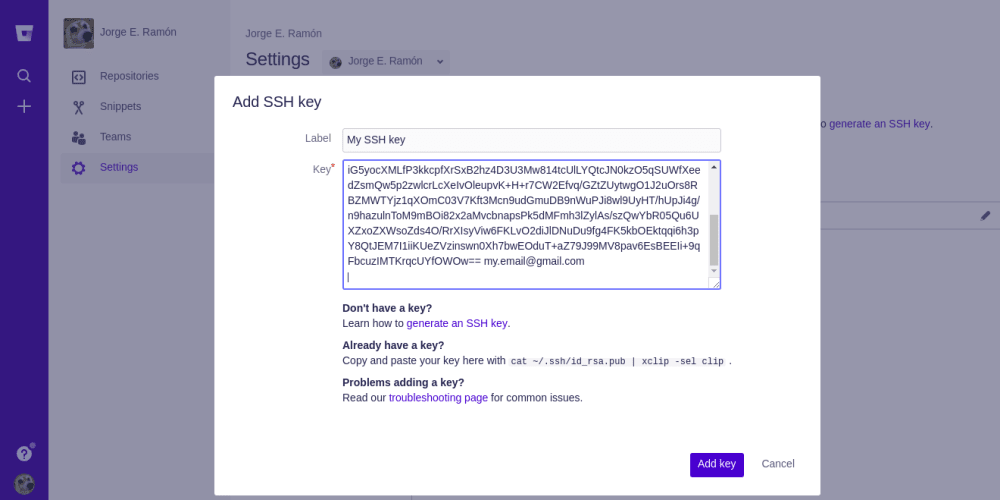Git Generate Ssh Key Ubuntu
Apr 28, 2017 SSH keys are a necessity for Python development when you are working with Git, connecting to remote servers and automating your deployments.Let's walk through how to generate SSH key pairs, which contain both a public and a private key within a single pair, on Ubuntu Linux. Create your SSH keys with the ssh-keygen command from the bash prompt. This command will create a 2048-bit RSA key for use with SSH. This command will create a 2048-bit RSA key for use with SSH. You can give a passphrase for your private key when prompted—this passphrase provides another layer of security for your private key. If you don’t have these files (or you don’t even have a.ssh directory), you can create them by running a program called ssh-keygen, which is provided with the SSH package on Linux/Mac systems and comes with the MSysGit package on Windows: $ ssh-keygen Generating public/private rsa key pair.
Setup git push with SSH Generate SSH KEY with ssh-keygen ssh-keygen -t rsa -C 'yourgithubemail@example.com' Github SSH connection setup 1. Copy the ssh from local machine.
SSH keys are an access credential used in SSH protocol (Secure Shell) which is a network protocol that helps to login from one computer to another securely, as well as to manage networks, operating systems, and configurations. This snippet is going to help you add an SSH key to the ssh-agent, generate a new SSH key, learn how to find the SSH key of your PC and how to connect it with your GitHub/bitbucket account. You can also find information on the use of SSH keys.
How should row keys be generated in hbase 1. Now let's find out how we can checkout PC's SSH keys.
Checking PC's SSH Keys
Type ls -al ~/.ssh so as to see your ssh keys:
By default, the filenames of the public keys are one of the following:
Generate a new SSH key
Generate Ssh Key Aix
Type this below, using your GitHub's account email:
The following text will show up after which you can hit the “Enter” button:
In this section, you can hit “Enter” again or type the secure passphrase (more about passphrase). Generate public key from private aws.
Adding an SSH key to the ssh-agent

Now let’s find out how we can add the SSH key to ssh-agent. Before adding, check your ssh keys or generate a new key.
- Be sure ssh-agent is enabled:
- Add your SSH key to the ssh-agent. If you used an existing SSH key rather than generating a new SSH key, you would need to replace id_rsa in the command with the name of your existing private key file:

How To Add SSH Key To Github Account
- Log into your Github's account. In the top right corner of any page, click your profile photo, then click Settings.
- In the user settings sidebar, go to SSH and GPG keys.
- Click New SSH key.
- Type Title and your SSH Key.
You can get your ssh key by typing below.
Now you have added your PC's SSH key to your Github's account.
Back up old SSH keys
If there are existing SSH keys, but you do not want to use them for connecting to Bitbucket Server, you should back up these old keys running the following:
Why we need SSH key (for Linux and OSX)
Git Generate Ssh Key Ubuntu Windows 7
If you use Git and want to clone anything from remote repositories, you have to choose one of these two ways: HTTPS or SSH. If you use HTTPS, you have to type your account access every time you communicate with the remote repository, or change your configs and fill your account data (access). Another modern way is to use the SSH authentication method. It is used in many Version Control Systems to have command line access into your servers, etc. SSH key pairs can be used for authentication instead of passwords. Each key pair consists of a private key and a corresponding public key. When you use SSH key for Git, you inform Git that this PC is authenticated for that Github account, and it will never ask you about any access again because you have already given it your SSH key.